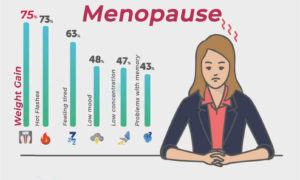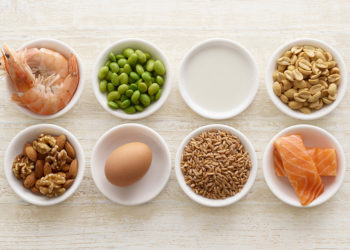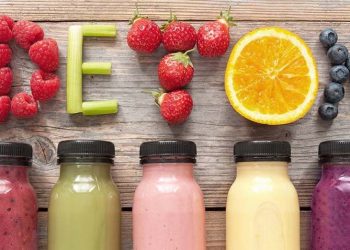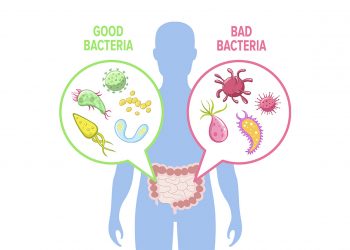How to manage menopause weight loss ?

75% of women experience weight gain during menopause
Nutritional guide to weight loss at the menopause and premenopause
The menopause, an inevitable stage in a woman’s life, often brings its own set of challenges, including weight management. The hormonal changes that accompany the menopause can make weight loss more difficult, but it’s not impossible. With the right nutritional approach, it is entirely possible to maintain a healthy weight and promote well-being after the menopause. 75% of women experience weight gain from premenopause onwards, and this phenomenon continues later in life. On average, women can gain 7-10% of their body weight, while losing muscle weight. In this article, we will explore effective nutritional strategies for weight loss at the menopause.
The challenges of weight loss during the menopause
Menopause is accompanied by a number of hormonal changes, in particular, a reduction in oestrogen levels. This can lead to a redistribution of body fat, with a tendency to accumulate more fat around the waist, increasing the risk of cardiovascular disease and type 2 diabetes. In addition, the basal metabolic rate tends to slow down, meaning that post-menopausal women burn fewer calories at rest.
Nutritional strategies for weight loss during menopause
- Adopt a balanced diet: Prioritise a diet rich in fruit, vegetables, wholegrain cereals, lean proteins and healthy fats, giving priority to local and seasonal foods. Limit processed foods high in added sugars and saturated fats. Eating local and seasonal food has many benefits for your health and the environment. Local produce is often fresher, more nutritious and tastier, because it’s harvested when it’s ripe and doesn’t have to travel long distances to reach your plate.
- Portion control: Calorie requirements decrease with age, so it’s important to control portions to avoid consuming more calories than you need. Use smaller plates, take the time to savour each mouthful and listen to your body’s food signals to determine when you’re full.
- Favour protein: Protein is essential for muscle health and satiety. Make sure you include lean protein sources such as chicken, fish, eggs, legumes and low-fat dairy products in your meals. However, it’s also crucial not to overlook the benefits of plant proteins. As well as being a healthy alternative to animal proteins, plant proteins offer a wide range of health-boosting nutrients. Legumes such as beans, lentils and chickpeas are not only rich in protein, but also in fibre, minerals and antioxidants, making them an ideal choice for heart health and weight management. What’s more, tofu, a popular source of plant protein, is particularly notable for its culinary versatility and its richness in nutrients such as iron, calcium and essential fatty acids. By judiciously incorporating plant proteins into your diet, you can diversify your protein intake while supporting your weight loss goals and improving your overall health.
- The importance of healthy fats: As part of a balanced diet for weight loss after the menopause, it’s essential to recognise the importance of healthy fats. Fats are an essential source of energy and play a crucial role in many biological processes, including the absorption of fat-soluble vitamins (such as vitamins A, D, E and K) and the regulation of hormones. Good fats, such as the monounsaturated and polyunsaturated fatty acids found in avocados, nuts, seeds, olive and rapeseed oils, as well as oily fish such as salmon and mackerel, are beneficial for cardiovascular health and can help reduce inflammation. What’s more, healthy fats can promote satiety, which can help control appetite and reduce cravings. By incorporating sources of healthy fats into your daily diet, you can not only support your overall health, but also improve your weight loss efforts in a sustainable and balanced way.
- Managing carbohydrates: Opt for complex carbohydrates such as wholegrain cereals, vegetables and fruit, which provide sustained energy and promote satiety. Limit simple and refined carbohydrates, such as white pasta, sweets and sugary drinks, which can lead to blood sugar spikes and encourage fat storage.

A nutritionist and a chef create low-carb meals in the Allcook kitchen.
It’s difficult to maintain a healthy diet during childbirth when you have a busy professional and family life. What’s more, family members may have different nutritional needs. Cooking differently then becomes a real task. You don’t want to sacrifice your well-being either. Here’s where you can find help. The Allcook kitchen low-carb meal plan will help you find the balance. Developed by a nutritionist and a chef, it will help you control your weight and continue to enjoy food, because you can find suitable options for you and other family members.
- The importance of liver detoxification: In the context of weight loss after the menopause, liver health is of particular importance. The liver plays a central role in the metabolism of fats and carbohydrates, as well as in the elimination of toxins from the body. Certain vegetables are known for their ability to support liver health and promote detoxification. These include kale, spinach, broccoli, cauliflower and dandelion greens. These vegetables are rich in phytochemicals, antioxidants and fibre, which help stimulate the liver enzymes involved in detoxification and eliminate harmful substances from the body. By regularly incorporating these vegetables into your diet, you can support the health of your liver and promote an optimal metabolism, which can facilitate weight loss and improve your general well-being after the menopause. You can try one of the vegan meal plans, balanced with essential amino acids and protein, specially designed to support your liver in the detoxification process.
- Hydration: Make sure you stay well hydrated by drinking enough water throughout the day and outside of meals. Sometimes thirst can be confused with hunger, so drinking water can help prevent overeating.
- Avoid drastic diets: Restrictive diets can lead to rapid but often unsustainable weight loss with a yo-yo effect. Instead, opt for sustainable, healthy dietary changes that can be maintained over the long term.
Not just weight loss
Improving nutrition will help to find an overall balance in life and address other symptoms of menopause such as mental fog and lack of concentration, as well as improving memory.
Weight loss after the menopause can present unique challenges, but with the right nutritional approach, it is entirely achievable. By adopting a balanced diet, controlling portions, favouring proteins and complex carbohydrates, and staying well hydrated, you can achieve and maintain a healthy weight after the menopause. Always consult a health professional or nutritionist for advice tailored to your individual needs.





